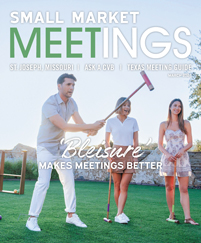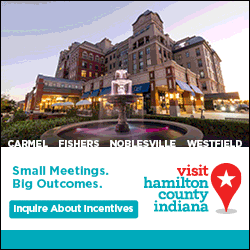Virginia meetings make history.
Meeting planners looking to book events in “the room where it happened” should look no further than these historic Virginia venues, which have witnessed some of the most notable events in America’s past, hosted U.S. presidents and business icons, and influenced modern culture.
Oatlands
Leesburg
Situated on 415 acres, about 15 minutes outside Leesburg, Oatlands is a historic plantation owned by the National Trust for Historic Preservation. It includes a beautiful Greek Revival-style mansion that was built in 1804, a historic carriage house, 4.5 acres of gardens and several hiking trails. The property also has several barns, outbuildings and a greenhouse.
After William and Edith Eustis, a powerful couple from Washington, D.C., purchased the property in 1903, it played host to several U.S. presidents. Edith was the daughter of Levi Parsons Morton, a former minister to France and the U.S. vice president in the administration of President Benjamin Harrison. She was also lifelong friends with Franklin D. Roosevelt, who visited Oatlands on several occasions.
Visitors can take guided tours of the mansion and gardens or rent space for meetings and events. The historic carriage house can accommodate groups of up to 90 guests, while the greenhouse can seat up to 60 people at long tables. The Retreat is a six-bedroom, six-bath historic home that has multiple sitting rooms for breakout sessions, outdoor spaces for breaks and a sunroom that can seat 20 at round tables. The Retreat can also be rented for overnight accommodations. Many garden areas are also available for events.
Larger groups can set up an outdoor tent for up to 300 guests with beautiful views of the gardens and fields. Groups can add guided tours of the mansion and gardens as part of their events.
The Grandin Theatre
Roanoke
Roanoke’s Grandin Theatre opened as a movie palace in 1932 and was the first theater in Roanoke to have talking pictures. It operated as a movie theater for more than 40 years before closing in 1976. Since then, the theater has changed hands a few times and is now run by the Grandin Theatre Foundation, which renovated it and reopened it in 2002 as a local cinema house and cultural community center offering movies, concerts, seminars, rentals, educational matinees, talent shows, dance recitals and holiday programming.
The theater is located in historic Grandin Village, a pedestrian-friendly commercial district with boutique shops and restaurants. The main auditorium can seat 319 guests and features Art Deco furnishings, Shakespearean balconies, a full-size stage, a digital projector and a PA system. The upper left and upper right theaters can host groups of 74 each or be combined for a larger gathering. The smaller screening room can accommodate 36 people, and the main-floor lobby and second-floor gallery can host groups of 100 for a standing reception.
When it is not being rented out, the historic landmark shows first-run, independent and classic movies and is the only independently operated theater in the region.
The Obici House
Suffolk
The Obici House was built in the 1920s by Amedeo Obici, founder of Planters Peanuts, and his wife, Louise. The historic mansion was built to resemble a villa from Oderzo, Italy. It sits at the end of a tree-lined driveway overlooking the 18th green at Sleepy Hole Golf Course on the Nansemond River. An event venue since 2012, the property features original chandeliers, columns, stained-glass windows and hardwood floors. It also has two fireplaces.
The building has changed ownership several times. It was purchased by the city of Portsmouth, which built a golf course next to it and used the home as a clubhouse. About 15 years ago, the city of Suffolk repurchased the home, which was in bad shape and in danger of being condemned. The mansion was restored over a decade ago with private funds from the man who has leased the golf course for decades.
The home is now an event and wedding venue that can host up to 150 guests for formal seated dinners on the main level. A dance floor, tables and chairs are included in the rental. Groups can choose from a list of preferred caterers, and rentals include use of restaurant-quality kitchen, glassware, flatware and dinner plates. For A/V, the house features a linked TV system that can display slideshows during meetings or events.
The Historic Post Office
Hampton
Situated along the historic waterfront in Hampton, The Historic Post Office was completed in 1914 in the Beaux-Arts architectural style. It served as a post office from 1914 to 1986. After the building was retired from service, it was turned into a restaurant, nightclub and film studio before being converted into an event venue in 2017. Because it is on the National Register of Historic Places, the current owners have maintained several historic features of the building. The building’s exterior, brick walls and hardwood floors in the front half of the building are all original.
When groups book the venue for events, they are the only ones in the building at that time. Large groups can rent out the wraparound mezzanine and downstairs portion of the main room. Smaller groups can rent the first level. The space is a bit fancier than the typical hotel ballroom, with its dark wood floors, white brick walls and historic elements throughout, as well as downlighting that can be programmed to match the colors of an event. The neutral backdrop allows meeting planners to decorate the space in the style and colors they choose.
Groups can select from a list of preferred caterers and can use the catering kitchen in back. Tables, chairs, linens, napkins, setup and breakdown are all included. The venue works closely with a local audiovisual company to provide A/V services for events.
The facility can host groups of up to 250 for a seated event or up to 400 for a cocktail reception.
Shields Tavern
Colonial Williamsburg
Visitors to Colonial Williamsburg will recognize Shields Tavern as one of the oldest buildings in town. Founded in 1709, the tavern served as a gathering place for locals and travelers alike. Guests would pay a set fee for a meal and then share communal sleeping arrangements.
Shields Tavern became one of Williamsburg’s seven licensed taverns by 1750, catering to the lesser gentry with food, drink and entertainment. Groups can tap into the tavern’s Colonial charm by renting out its spaces for events. The building is divided into smaller rooms but, in total, can host groups of 250. The largest room in the building can accommodate 55 to 60 guests.
The facility re-creates an 18th-century tavern meal for its patrons. Servers dress in Colonial attire, and musicians and balladeers move from room to room playing period music. The tavern is known for its Groaning Board menu of locally sourced meats and vegetables. The term “groaning board” got its start in the Middle Ages to describe a situation where so much food is brought to a table that the boards groan under the weight of it. At Shields, that includes fried chicken, potato pudding and fresh local vegetables served family style. There are also specialized alcoholic beverage offerings, including rum punch bowls for the table.
Groups that book events at the tavern can choose to have a fife and drum escort lead them to the event from the hotel where they are staying. For evening events, the rooms are lit with candles, and participants can take a ghost tour of Williamsburg or attend productions at the historic site’s re-created Capitol building.












